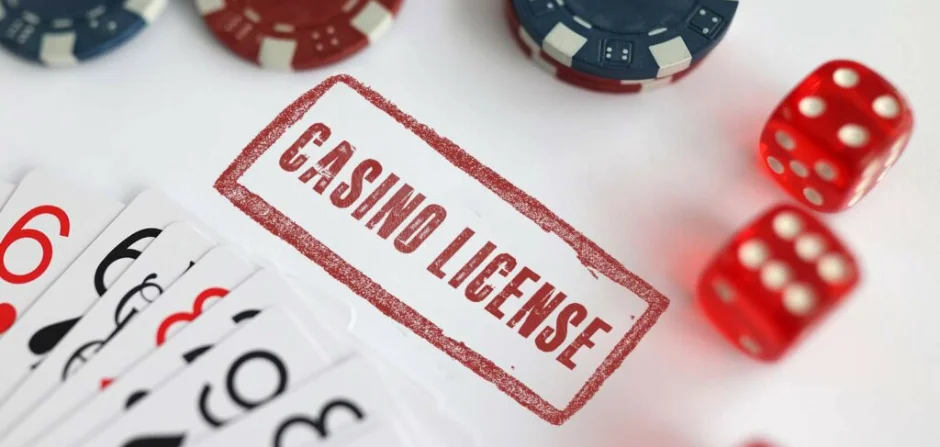Online Casino Laws: A Complete Guide to Legal Regulations, Licensing, and Player Protection
Online casinos have exploded in popularity, but the legal landscape around them can feel like a maze. I often get questions from friends and readers who want to know if playing their favorite slots or poker games online is really allowed where they live. The truth is the rules aren’t always clear and they can change from state to state or country to country.
I’ve spent a lot of time researching online casino laws and I know how confusing it can get. Whether you’re a casual player or thinking about trying your luck for the first time, understanding the basics of online casino regulations is key. Let me break down what you need to know so you can play with confidence and stay on the right side of the law.
Overview of Online Casino Laws

Overview-of-Online-Casino-Laws
Online casino laws control digital gambling activities and differ across countries, states, and sometimes cities. I’ve tracked the unique approaches that shape these legal environments. Some regions, like the United Kingdom and Malta, regulate and license online casinos through government agencies. Others, such as several US states and many Asian countries, restrict or prohibit access entirely.
Enforcement varies by jurisdiction. I see strict penalties in countries where all forms of online gambling remain illegal. By contrast, licensed markets usually require operators to follow rules about fairness, responsible gaming, and anti-money laundering. Most regulated spaces use compliance monitoring to keep players protected, referencing frameworks like the UK Gambling Commission or New Jersey Division of Gaming Enforcement.
Legal acceptance can hinge on where the operator’s servers are based and where the player accesses services. Cross-border gambling often introduces additional complications. I check whether operators possess valid licenses and provide clear terms that comply with local law.
Table: Online Casino Law Status by Country
| Country | Regulation Status | Licensing Body | Notes |
|---|---|---|---|
| United Kingdom | Legal, Regulated | UK Gambling Commission | Licensed operators, strict controls |
| United States | Mixed (state-based) | State-level gaming authorities | Some states legal, others prohibit |
| Malta | Legal, Regulated | Malta Gaming Authority | International licenses, EU focus |
| Canada | Legal, Regulated | Provincial regulators | Province jurisdiction, private operators |
| Germany | Legal, Regulated | Federal & state authorities | New national licensing system |
| China | Illegal | – | Strict bans, exceptions in Macau |
| Australia | Restricted | ACMA | Online casinos broadly prohibited |
Operators usually display their licensing details in the website’s footer. I recommend verifying these credentials before creating an account to guarantee legal play and player protection within your locality.
Key Legal Frameworks Governing Online Casinos
I review online casino legal landscapes by mapping the most influential laws at federal and state levels. Statutes vary by region, creating a fragmented environment for both operators and players.
Federal Laws and Regulations
I track three main federal statutes that shape US online casino regulation.
- Wire Act of 1961: Bars interstate transmissions of betting information for gambling, unless operators and bettors remain within states that permit it, constraining multistate online casino offerings.
- Unlawful Internet Gambling Enforcement Act (UIGEA) of 2006: Restricts banks from processing payments tied to illegal internet gambling, with exceptions in states that legalized and regulate online casinos.
- Professional and Amateur Sports Protection Act (PASPA) Repeal in 2018: Allows states to authorize and regulate online gambling for themselves, although this directly impacted sports betting, not casino-style games.
| Federal Law | Year | Effect on Online Casinos | Notable Clause |
|---|---|---|---|
| Wire Act | 1961 | Prohibits interstate online casino betting | Applies only when transmission is across state lines |
| UIGEA | 2006 | Limits payment processing for illegal gambling | Excludes intrastate, properly licensed operations |
| PASPA (repealed) | 2018 | Permits states to legalize online gambling independently | Direct impact on sports betting; indirect policy shift for online casinos |
State-by-State Variations
I assess state-level laws, finding diverse regulatory models.
- Full Legality: States like New Jersey, Pennsylvania, and Michigan legalize and regulate online casinos, with comprehensive frameworks for licensing, taxation, and player protections.
- Partial Legality: States like Delaware and West Virginia permit limited forms of online gambling, such as specific casino games or lottery-based offerings.
- Prohibition: States including Utah and Hawaii bar all types of online gambling, enforcing bans on operators and players.
| State | Legal Status | Licensing Body | Player Restrictions |
|---|---|---|---|
| New Jersey | Legal, regulated | NJ Division of Gaming Enforcement | Age 21+, geolocation required |
| Pennsylvania | Legal, regulated | PA Gaming Control Board | Age 21+, in-state access only |
| Michigan | Legal, regulated | Michigan Gaming Control Board | Age 21+, state-resident not required |
| Utah | Prohibited | None | All online gambling banned |
| Delaware | Partial legality | Delaware Lottery | Limited games via state-licensed |
I focus on these key frameworks because each creates distinct operational and legal obligations for online casino operators serving US players.
International Perspectives on Online Casino Laws
Online casino laws differ significantly by jurisdiction, creating a fragmented global environment. I often reference updated legal databases and government websites to ensure regulatory accuracy. Licensing models, enforcement intensity, and player protection requirements show substantial regional variation.
Major Regulatory Models
- Liberal Licensing (Examples: United Kingdom, Malta, Sweden)
Governments issue licenses, set rigorous guidelines on consumer protection, and audit operators for compliance. These models encourage international operators to base their services within national frameworks.
- Partial or Restricted Access (Examples: Germany, Canada, Australia)
Authorities permit some forms of online casino gambling, typically with restricted licenses, regulated payment methods, and localized consumer safeguards. Some provinces or states permit activity, while others forbid access.
- Prohibition and Blacklisting (Examples: China, Singapore, Saudi Arabia)
Governments criminalize online gambling, block websites, and penalize unauthorized access. Enforcement can include fines, website blacklists, and prosecution.
Online Casino Licensing Bodies Table
| Country | Licensing Authority | Legal Status | Notable Restrictions |
|---|---|---|---|
| United Kingdom | UK Gambling Commission | Legal/Regulated | Strict KYC, player exclusions |
| Malta | Malta Gaming Authority | Legal/Regulated | AML/CFT compliance, international licenses |
| Sweden | Spelinspektionen | Legal/Regulated | Gaming limits, self-exclusion |
| Germany | Glücksspielbehörde der Länder | Legal/Restricted | Slots OK, table games mostly restricted |
| Canada | Provincial gaming boards | Partially Legal | Varies by province |
| Australia | ACMA, state governments | Legal/Regulated | Only for residents, offshore blocks |
| China | N/A | Prohibited | ISP blocking, prison terms |
| Singapore | Casino Regulatory Authority | Prohibited | Website bans, heavy fines |
| United States | State-specific authorities | Mixed (state dependent) | State-by-state authorization |
Global Enforcement Patterns
Authorities in regulated regions conduct regular audits, require anti-money laundering processes, and impose strict player verification. I note that banned markets use aggressive domain blocking and financial transaction monitoring. Cross-border access remains a challenge, as geo-blocking tools and payment restrictions continue to evolve.
International organizations, like the Financial Action Task Force (FATF), influence national frameworks by promoting anti-money laundering guidelines. I always verify operator credentials through official licensing registries before engaging with any global online casino platform.
Licensing and Regulatory Bodies

Licensing-and-Regulatory-Bodies
Licensing and regulatory bodies create legal frameworks and enforce compliance for all online casino operators and platforms. Regulatory agencies exist in nearly every region, though their authority, standards, and consumer protections vary.
Major Online Casino Licensing Authorities
I track several licensing authorities that regulate the world’s online casinos. Each one implements distinct player protection rules, anti-money laundering directives, and responsible gambling obligations.
| Country/Region | Licensing Authority | Main Focus Areas | Public Verification Tools |
|---|---|---|---|
| United Kingdom | UK Gambling Commission (UKGC) | Fair play, player protection | License register |
| Malta | Malta Gaming Authority (MGA) | Integrity, money laundering | License search |
| Sweden | Spelinspektionen | Consumer rights, safe gaming | License list |
| New Jersey (US) | New Jersey Division of Gaming Enforcement | Geolocation, fairness, AML | License lookup |
| Gibraltar | Gibraltar Regulatory Authority | Operator compliance, risk | Register of licensees |
| Isle of Man | Isle of Man Gambling Supervision Commission | Audit, player disputes | Licensed operator list |
| Curacao | Curacao eGaming Licensing Authority | Broad licensing, global access | Seal verification |
| Ontario (Canada) | Alcohol and Gaming Commission of Ontario | Regulation, responsible gaming | License database |
Only operators with valid licenses from recognized bodies such as UKGC and MGA demonstrate robust compliance and consumer safeguards.
Regulatory Body Functions
Licensing and regulatory bodies deliver oversight in three primary areas:
- Issuing Licenses: I observe that agencies require background checks, financial disclosures, and detailed compliance plans before granting licenses.
- Monitoring Compliance: They conduct audits, test software, and assess adherence to anti-fraud, fair gaming, and anti-money laundering regulations.
- Enforcing Sanctions: Breaches result in fines, suspension, or license revocation if agencies discover violations during inspections or through player complaints.
Agency websites commonly provide public tools allowing me to confirm an operator’s license and regulatory history before playing.
Compliance Standards
Regulatory frameworks, such as the UKGC’s LCCP and MGA’s Player Protection Guidelines, align in core areas:
| Standard Area | Common Regulatory Requirement |
|---|---|
| Responsible Gambling | Self-exclusion tools, deposit limits |
| Player Verification | Identity and age verification |
| Fair Play | Independent RNG/software audits |
| Payment Security | Anti-money laundering and secure fund management |
| Transparent Terms | Clear bonus rules, wagering requirements |
Online casinos holding current, verifiable licenses from recognized bodies assure greater security and recourse for players across regulated and partially regulated markets.
Legal Risks and Consumer Protections
Online casino laws create legal risks for both operators and players, especially in unregulated or prohibited jurisdictions. I see that players could face account closures or withheld winnings if authorities prove gambling violations, while operators may receive heavy fines, license suspensions, or criminal penalties. Compliance failures like offering services in banned regions or violating anti-money laundering (AML) protocols often trigger investigation and enforcement.
Consumer protections play a key role in safeguarding players. Regulated online casinos enforce verification checks to prevent underage gambling, mandate secure payment channels, and implement responsible gaming features like deposit limits and self-exclusion. In licensed markets, regulatory bodies typically oversee dispute resolution and player compensation through formal complaints procedures. Unlicensed or offshore platforms rarely provide effective consumer recourse, leaving players exposed to unfair practices and potential financial loss.
Regular audits and technical testing maintain integrity for games of chance. Independent regulatory agencies often require licensed operators to engage certified labs like eCOGRA to confirm payout fairness and random number generator (RNG) reliability.
Table: Major Consumer Protections by Regulatory Authority
| Regulatory Authority | Player Fund Security | Responsible Gaming Tools | Dispute Resolution | AML Compliance |
|---|---|---|---|---|
| UK Gambling Commission (UKGC) | Segregated Accounts | Self-exclusion, limits | Official complaints | Required |
| Malta Gaming Authority (MGA) | Segregated Accounts | Deposit limits, RG checks | ADR providers | Required |
| New Jersey DGE (USA) | Dedicated escrow | Time-outs, limits | Regulator mediation | Required |
| Swedish Gambling Authority | Segregated Accounts | Spelpaus, RG tools | Licensee escalation | Required |
If a player chooses a licensed online casino, robust protections ensure financial safety and access to dispute mechanisms. If gambling through unregulated or blacklisted sites, recourse options and consumer protections remain minimal or non-existent.
The Future of Online Casino Legislation

The-Future-of-Online-Casino-Legislation
Online casino legislation trends continue to shift as governments monitor growing digital gambling markets. I see jurisdictions updating legal frameworks to balance revenue generation, consumer protection, and crime prevention. Policymakers in regions like the US, Germany, and Australia propose new bills every year to address cross-border gambling and emerging technologies such as blockchain payments or virtual reality casinos.
Regulatory agencies analyze data on player behavior, payment flows, and fraud to inform new rules. I track ongoing debates on harmonizing licensing standards across jurisdictions, especially within the European Union and North America. Lawmakers consider multistate or multinational agreements for transparent, interoperable systems that facilitate player verification and tax collection.
Emerging technologies—including blockchain for transaction tracking and advanced KYC (Know Your Customer) systems—enter legislative discussions as tools for compliance and a barrier to underage gambling or identity fraud. If widespread cryptocurrency adoption occurs, I expect regulatory bodies to amend AML (Anti-Money Laundering) compliance requirements, referencing guidelines from organizations like the FATF.
International trade agreements and court rulings also influence the legal status of online casino operators. For example, World Trade Organization cases involving Antigua and the US highlight conflicts between national gambling restrictions and global digital commerce. I observe growing industry calls for standardization of gambling-related payment and data privacy regulations.
Table: Projected Online Casino Regulatory Developments by Region (2024-2027)
| Region | Current Trend | Projected Change | Regulatory Focus |
|---|---|---|---|
| United States | Gradual state legalization | Expansion into more states, tighter payment controls | Responsible gambling, AML |
| Europe | Harmonization debates | Movement toward shared standards, cross-border play | Licensing, consumer safety |
| Asia-Pacific | Restrictive, fragmented | Selective liberalization, stricter enforcement | Fraud prevention, tax |
| Africa | Slow adoption, piecemeal | Introduction of national frameworks | Licensing, market control |
| LatAm | New regulated markets grow | Regional cooperation, unified platforms | Operator accountability |
Ongoing legislative changes accelerate as more states and countries assess revenue benefits and social costs. I monitor regulatory bodies’ publications and legislative calendars for up-to-date drafts and enacted laws, with consumer protection and transparent operations as central priorities.
Conclusion
Navigating online casino laws can feel overwhelming but staying informed is the best way to protect yourself and your finances. I always recommend checking the latest regulations in your area before signing up with any platform.
Choosing licensed operators isn’t just about legality—it’s also about ensuring fair play and secure transactions. As the industry evolves I’ll keep tracking new developments so you can play with confidence and peace of mind.
Frequently Asked Questions
Is online casino gambling legal everywhere?
No, online casino gambling laws vary by country, state, or even city. Some regions fully legalize and regulate online casinos, while others impose restrictions or total bans. Always check your local regulations before playing.
How do I know if an online casino is legal in my area?
Check the licensing details on the casino’s website and confirm with your local gaming authority. Playing only on licensed, regulated platforms ensures compliance and player protection.
What risks do players face in unregulated or banned jurisdictions?
Players in these areas risk having their accounts closed, winnings withheld, and potentially facing legal action. Operators may also face heavy fines or penalties.
Why is operator licensing important for online casinos?
Licensed casinos are overseen by regulatory agencies that ensure fair play, security, proper payment handling, and dispute resolution, offering greater trust and protection for players.
How do consumer protections work in regulated online casinos?
Regulated casinos enforce player verification, secure payment methods, game fairness audits, and responsible gaming tools, ensuring a safe and transparent gambling environment.
What should I check before joining an online casino?
Always verify the operator’s license with a recognized authority, read reviews, ensure secure payment options, and review their consumer protection policies.
What are the main US laws affecting online casinos?
The Wire Act of 1961 prohibits interstate gambling, the UIGEA of 2006 restricts payments to illegal sites, and states may legalize online casinos following PASPA’s repeal in 2018.
Are online casino laws changing in the future?
Yes. Governments continue to adapt laws to balance regulation, consumer protection, and new technologies, with a trend toward more standardized and transparent legal frameworks.
What’s the difference between regulated and unregulated online casinos?
Regulated casinos operate under official oversight, providing player safeguards and legal recourse. Unregulated or blacklisted sites lack these protections, making players vulnerable to unfair practices.
How do international regulations affect online casino access?
Depending on your country, you may face restricted access, required player verification, or blocked transactions. Always verify legality and licensing before playing online.
